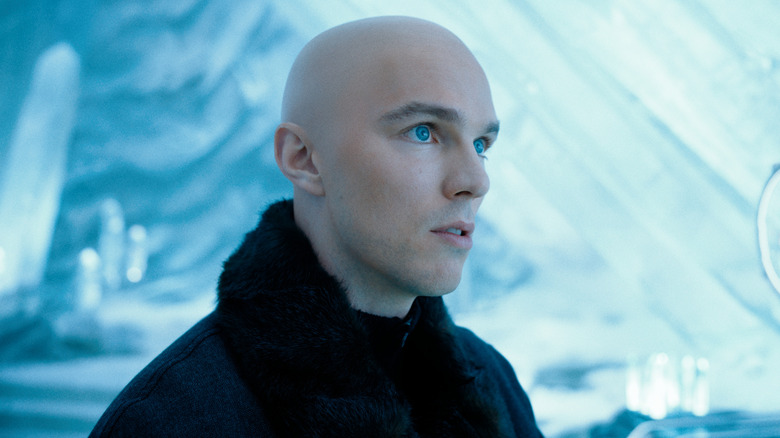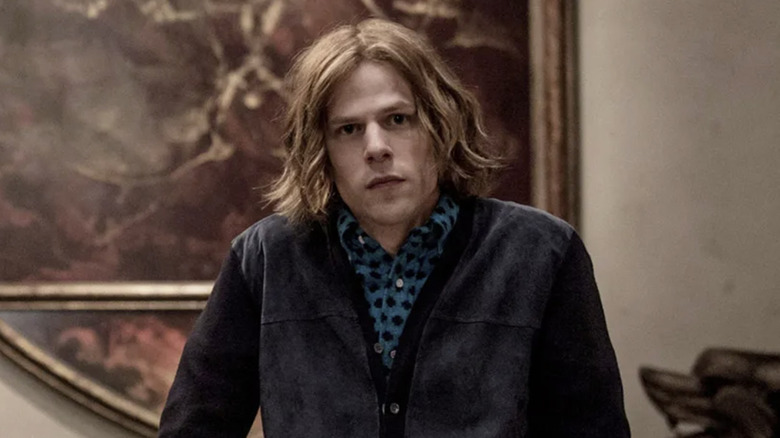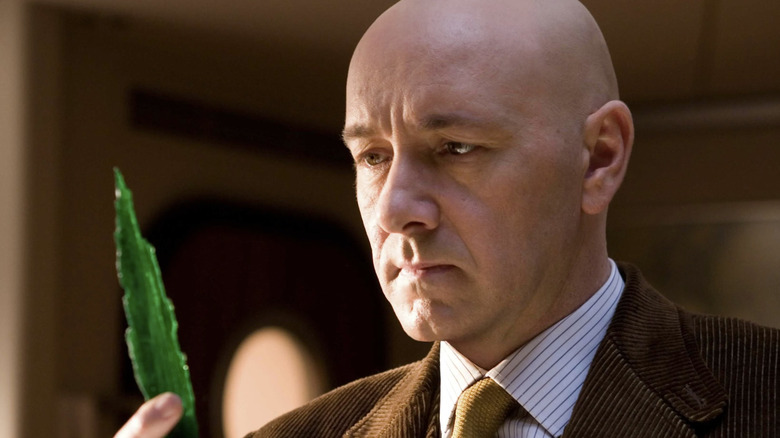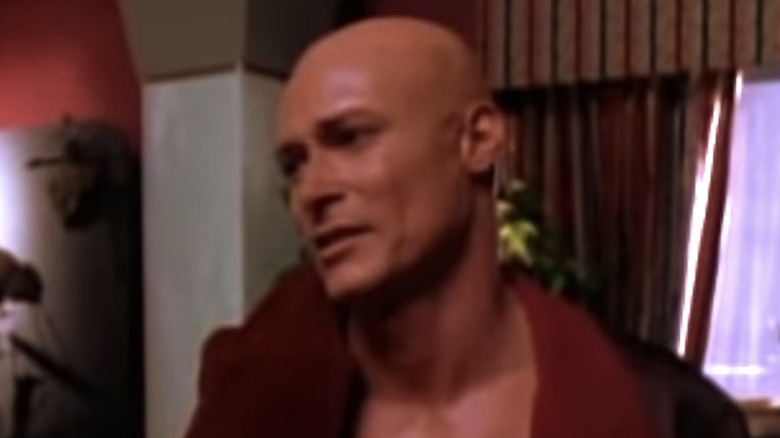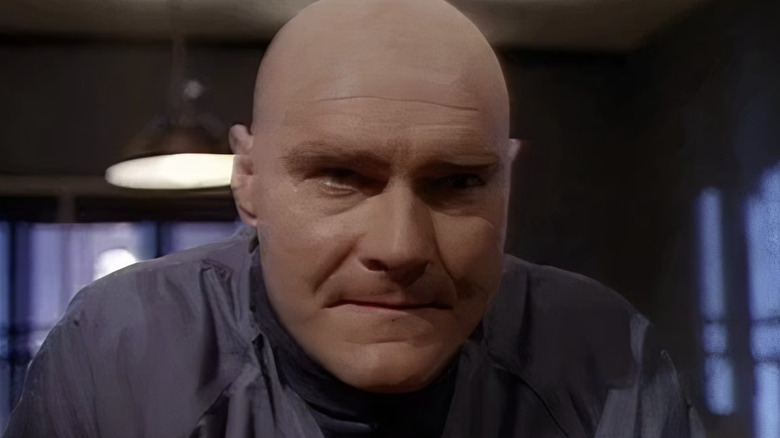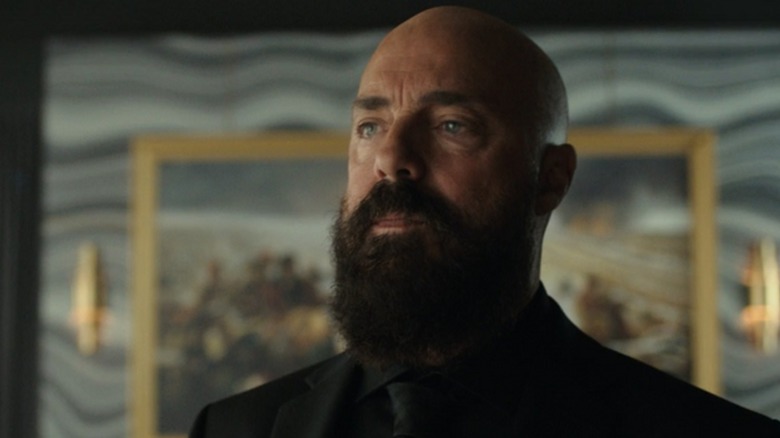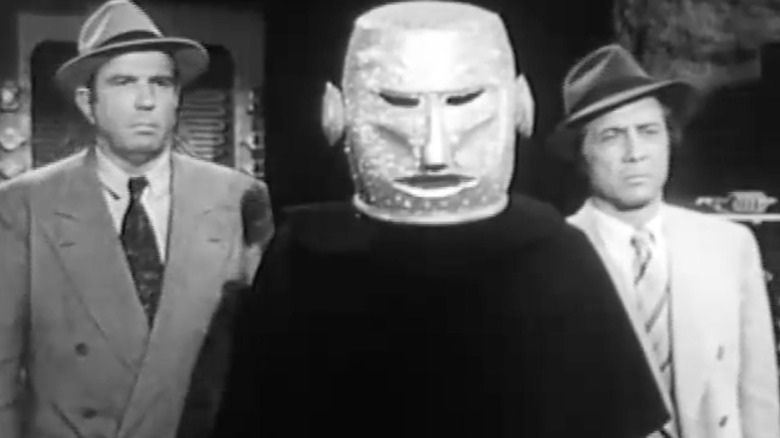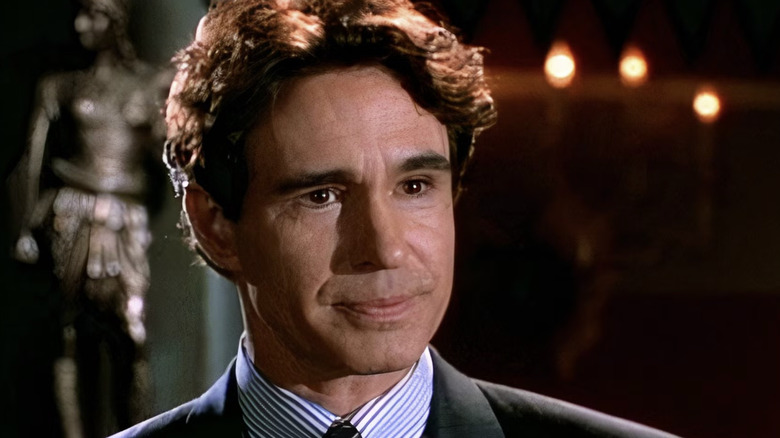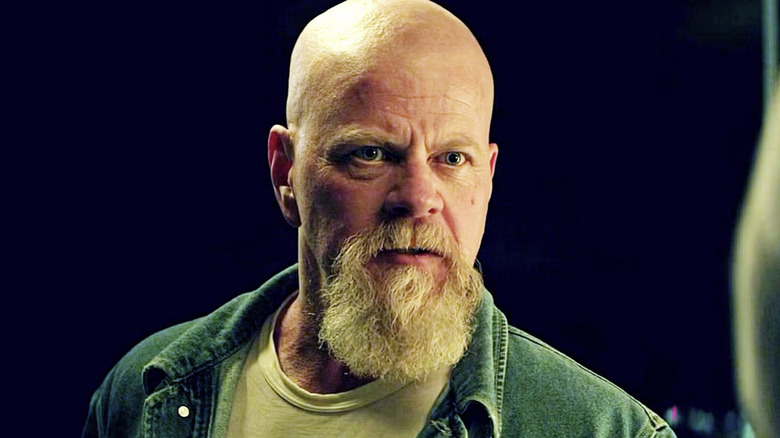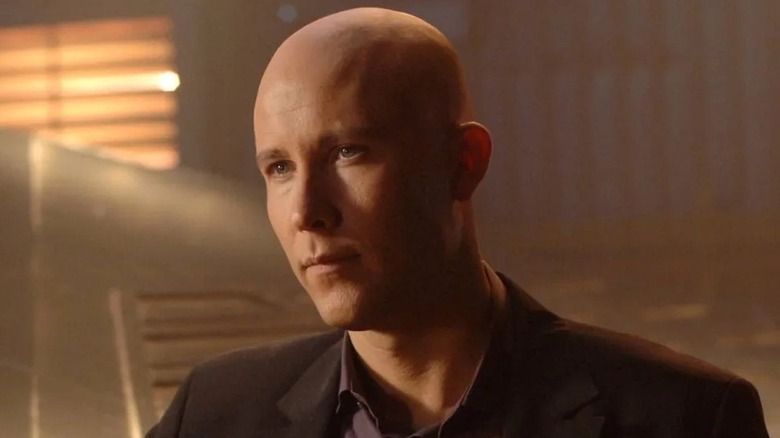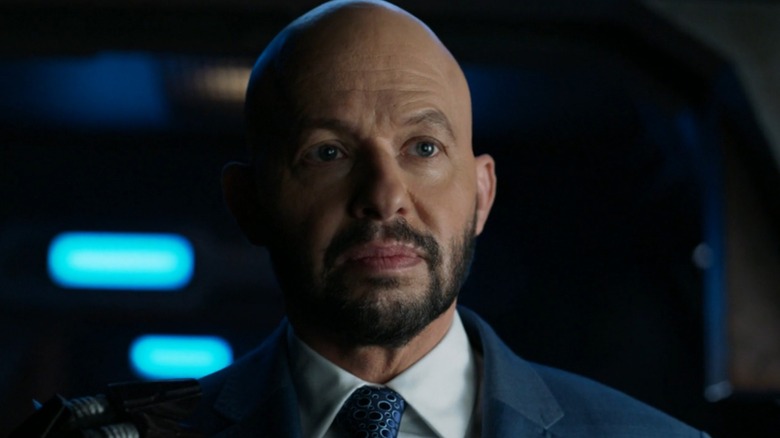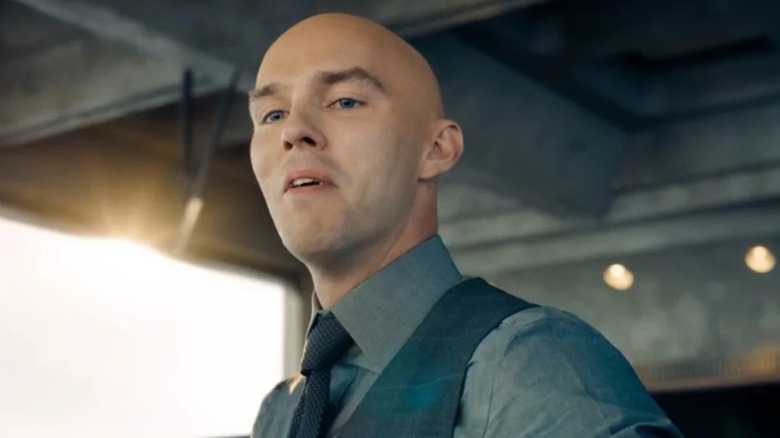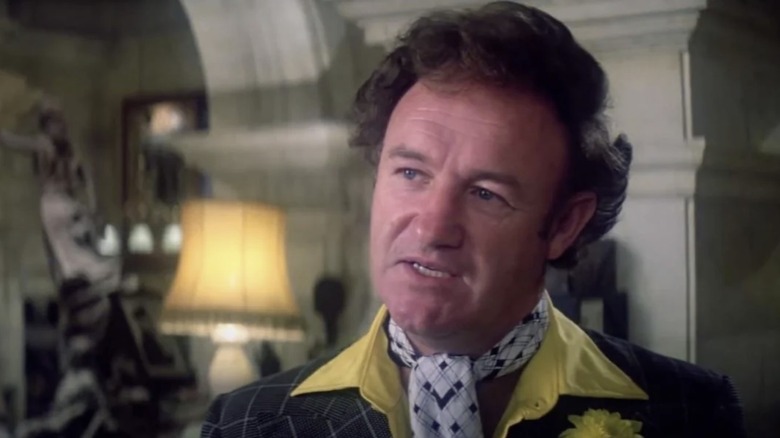Every Version Of Lex Luthor Ranked Worst To Best
For over 70 years, Lex Luthor has been Superman's most relentless enemy, and in that time, he's gone through a lot of changes. He's been a renegade super-scientist, a high-tech villain dedicated only to crime, a billionaire businessman who believes that true power comes from money and control, and a teenage rival with a grudge against baldness.
Believe it or not, all those versions of Lex have made it into live-action "Superman" projects in one form or another. And just like his Kryptonian arch-nemesis, Lex Luthor's journeys onto the screen haven't always been great. From awkward missteps to perfect moments, here's every live-action version of Lex Luthor, ranked from worst to best.
12. Jesse Eisenberg (Batman v Superman: Dawn of Justice)
On paper, recasting Lex Luthor for 2016 as a (slightly more) evil combination of Mark Zuckerberg and Elon Musk is as solid an idea as the Lex of the 1980s being rebooted as the owner of a massive corporation. It's an interesting update on a take that's worked well before, and making him a younger, smarmier, and infinitely more punchable Luthor is a great way to distinguish him from earlier portrayals. With that in mind, casting Jesse Eisenberg made perfect sense — if you're doing an Evil Mark Zuckerberg, you might as well get the guy who played him in "The Social Network," right?
In reality, however, the Lex Luthor of "Batman v Superman: Dawn of Justice" is arguably the worst take on the character in any medium — and with the nearly endless number of comics, cartoons, and other stories out there, that's saying something. Eisenberg's portrayal as a legitimately offensive gay-panic sex creep would have come off as being a little over the top even in the '70s.
Beyond that, he's working with a script that never quite gets around to explaining why Lex wants Superman and Batman to fight each other (one of its many confusing plot holes), but makes sure to spend plenty of time on why a big part of his evil master plan revolves around literally urinating into a jar and mailing it to someone. Eisenberg tries hard, but there's just nothing good here.
11. Kevin Spacey (Superman Returns)
Many viewers cite Kevin Spacey's performance in Bryan Singer's "Superman Returns" as one of the high points of the 2006 film. They're right, but that's also like saying that getting a taste of a melted candy bar is the high point of shoving a handful of trash into your mouth.
Spacey's Luthor is the best part of the movie by default. In a movie that's defined by being so achingly slow that Superman never throws a punch, he's the only one who actually gets to do anything. To his credit, he makes the most of what he's given, chewing scenery to create a performance so memorable that screaming "Wrong!" in Lois Lane's face became a meme in its own right. Even with that, though, there's only so much you can do.
The fact that Singer's take on Superman was a throwback to the Richard Donner films of the '70s wasn't a secret — it was, in fact, a selling point. Unfortunately, that meant that Spacey's Luthor wasn't just involved in a large-scale real estate scheme, he was also just doing a cover version of Gene Hackman's performance. In a better film, that kind of homage could have worked, but here, it's just a constant reminder that you could be watching something better.
10. Scott James Wells (Superboy)
The first season of the "Superboy" TV show that ran from 1988 to 1992 is, to put it charitably, not very good. Focusing on a younger version of Clark Kent in an effort to update him for what the promos billed as "the superhero of the '90s" was a good idea, but the shoestring budget for special effects doesn't really go well with a character whose best known quality is his ability to fly, and the stories often fell pretty flat.
In the second season, the show would get into some pretty memorable stuff, but in the first season, it stumbled pretty hard trying to figure out how to do Superman stories that would work with a college-age hero, and wound up with a Lex, played by Scott James Wells, that was more forgettable than anything else. As a scaled-down version of the villain he was meant to become later, Lex was a far cry from the devious scientific mastermind that viewers were expecting, to the point where his major criminal accomplishment was attempting to fix a basketball game he was betting on.
The one really interesting part, though, came at the end of the season, where Lex went from unsuccessful point shaving to straight up murdering people and stealing their faces in the span of about a day. Unfortunately, it marked such a new direction for the show — and saw both Lex and Superboy's actors, Wells and John Haymes Newton, replaced — that the first season might as well have not happened.
9. Sherman Howard (Superboy)
The thing to understand about Seasons 2 through 4 of the "Superboy" TV show is that they are wild. It's one of the weirdest versions of Clark Kent (Gerard Christopher) to ever hit the screen, as evidenced by the fact that the most famous moment is a dream sequence where Superboy is replaced by a new version of himself played by professional wrestler Lex Luger.
But while that sequence had the excuse of being a dream, the way the show rebooted Lex Luthor is just full-on bonkers. In an effort to combine the classic version of Lex, a childhood friend of Superboy's before going evil, with the evil older businessman of the modern version, the "Superboy" show came up with a pretty interesting solution. At the end of the first season, after suddenly losing his hair in that classic Silver Age style, Lex murders a local businessman and then gets plastic surgery to steal his identity, with the show switching to new actor Sherman Howard to go along with it. Unfortunately for Lex, his ruse is quickly exposed, but he never gets around to switching back to his original look, remaining in the body of a 50-year-old man for the rest of the series.
It's pretty bizarre, but there are some good points to it, including the fact that Howard just goes for it when he's tasked with acting like a criminally insane 20-year-old trapped in an older man's body. It does, however, raise a very important question: If Lex is that mad about losing his hair, why does he choose to look like a guy with a receding hairline?
8. Titus Welliver (Titans)
"Titans" focuses on a younger group of superheroes led by Dick Grayson, aka Nightwing (Brenton Thwaites), and Raven (Teagan Croft). Titus Welliver plays this show's version of Lex Luthor, but he doesn't appear until the fourth season.
Lex's story in the show is closely tied to Superboy (Joshua Orpin), who Lex has created as a clone infused with Superman's DNA. Welliver plays Lex in the Season 4 premiere, but by the end of the episode, Lex is killed by May "Mother Mayhem" Bennett (Franka Potente) and Superboy is framed for his death. Lex's death spurs an interesting story, but it cuts short any chance at the audience getting to know more about the character.
Welliver didn't get enough time to make much of an impression, but one thing about the "Bosch" star's version of Lex Luthor really stands out: his thick beard. Unsurprisingly, comic fans have mixed feelings about the show's decision to change up Lex's traditional look. One thing that almost everyone agrees on, though, is that Welliver was sadly underused in "Titans." At the very least, his version of the character has a compelling backstory that we get to hear about from other characters in the show.
7. Lyle Talbot (Atom Man vs. Superman)
Given the overall quality of the "Superman" serials of the '40s and '50s, it might come as a surprise to find out that they managed to do Luthor as well as they did. It was, after all, the first time the character had ever been brought to live action, and despite a few missteps, Lyle Talbot's performance is pretty great.
The biggest misstep is obvious. The "Atom Man" of the title is, of course, actually Luthor, who keeps his identity secret by wearing what Screencrush described as a "bedazzled kettle [with] eyebrows" and affecting a vaguely German accent. For a good chunk of the serial's 15 chapters — a whopping four hours in total — Talbot menaces the Man of Steel (Kirk Alyn) while wearing a glittery robot mascot head, and he actually manages to pull it off. The scene where he makes Lois Lane (Noel Neill) choose between two levers, promising that one will kill Superman and the other will save him, while knowing that both are actually deadly? That's classic Luthor.
What really makes Talbot's Luthor work, though, is how forward-thinking it seems in retrospect. The Atom Man's sinister plot revolves around a teleportation device that's essentially the same idea that "Star Trek" would use for its transporter beam 16 years later, and at one point, Luthor traps Superman in an "Empty Doom" dimension that predates the Phantom Zone of the comics. Even the Atom Man disguise is there because Luthor is masquerading as a legitimate businessman, an idea that would become part of his character 37 years later. For all the many shortcomings of "Atom Man vs. Superman," its Luthor holds up pretty well.
6. John Shea (Lois and Clark: The New Adventures of Superman)
More than any other live-action Lex Luthor, John Shea's version of Lex from "Lois and Clark: The New Adventures of Superman" got the sheer arrogance at the core of his character. Like his counterpart in the comics at the time, this was a Luthor who was a criminal because he simply saw no reason why laws made for lesser men should apply to him, and whose all-consuming hatred for Superman (Dean Cain) was rooted in the idea that there was one person he could never position himself above.
It's spelled out explicitly in the first episode, when Superman's parting shot to Lex is "If you ever need to find me, all you have to do is look up." And when Lex finally has Superman at his mercy, he doesn't want him dead — he wants him humiliated and broken, and holds off on killing him just so that he can lord it over him for as long as possible.
But for all that he had going for him, the "Lois and Clark" Lex had a pretty weird path as a character. He was dramatically killed off at the end of the first season, spent most of the second dead before his inevitable return, and was then used pretty sparingly for the rest of the run. In the fourth season, Shea only appeared as a voice. Still, what there was of his Lex was good stuff.
5. Michael Cudlitz (Superman and Lois)
"Superman and Lois" offered DC fans a fresh take on two of their favorite characters of all time. The show focuses on an older Superman (Tyler Hoechlin) who's already married to Lois Lane (Elizabeth Tulloch), and the story kicks off with the two of them returning to Smallville to raise their kids. The show often highlights more grounded Superman stories, which is part of why it takes a long time to introduce Michael Cudlitz's Lex Luthor.
Luthor first enters the fray in Season 3 when he's released from prison. He immediately gets to work planning revenge against Superman and his family, and Luthor's plans lead to the creation of Bizarro and eventually Doomsday. This version of Lex is a grizzled, experienced supervillain. All of his actions carry serious weight and the implication of a long history with Superman, which helps him make a huge impact on viewers despite "Superman and Lois" getting canceled in Season 4, shortly after his introduction.
Cudlitz's Lex is undoubtedly intimidating, but some fans were unhappy with how much the show changed his character from the version of Lex we see in the comics. If comic-accuracy isn't your number one criteria for rating a supervillain, however, then this version of Lex Luthor is absolutely excellent.
4. Michael Rosenbaum (Smallville)
"Smallville" was another attempt at reinventing Clark Kent for a younger audience by showing what he was like in the years before he became Superman, but there was one big problem: It was way too successful for its own good. The show was popular enough to run for a full 10 years, meaning that by the end of it, Clark (Tom Welling) had done pretty much everything you'd expect to see in a decade-long television show about Superman — including working at the Daily Planet, marrying Lois Lane, forming the Justice League, fighting Doomsday, dying, and coming back to life — all before he actually became Superman. The only thing he hadn't done by the series finale was wear his costume.
The original idea for Lex Luthor (Michael Rosenbaum) was that he and Clark would start the show as friends and grow to become foes by the end of it. Since nobody expected that journey to take 10 years, Lex wound up bouncing back and forth, being manipulated, and eventually having his memory wiped so that he could finally serve as Superman's arch-nemesis — handily erasing all that character development in the process.
That said, Rosenbaum brought an incredible charm and intensity to the role during his tenure on the show, and was frequently the best part of it regardless of where he fell on the good-to-evil alignment chart. The only real problem was that Lex was often overshadowed by his father, Lionel (John Glover), whose delightfully pure, mustache-twirling evil made him a far more entertaining character than Lex, or anyone else on the show.
3. Jon Cryer (Supergirl)
The CW "Supergirl" introduces a version of Lex Luthor, played by Jon Cryer, who's already got a long history as a supervillain. Cryer's Lex has already become the head of Luthor Corp and has taken his feud with Superman so far that he once turned the Earth's sun red to try and de-power the Kryptonian. This version of Lex is cold and ruthless, but he also gets caught up in some of the most comic-accurate stories ever put to live action, like "Crisis on Infinite Earths."
The way that Cryer manages to straddle the line between seriously scary and cartoonishly evil has endeared him to the hearts of many DC fans. People frequently rank his Luthor as one of the best live-action versions of the character. Oddly enough, this is the second time that Cryer's had the opportunity to portray a Luthor. He was Lenny Luthor, Lex's young nephew, in the much maligned "Superman IV," so his role in "Supergirl" gave him a chance to finally redeem himself in the eyes of comic book fans.
2. Nicholas Hoult (Superman 2025)
2025's "Superman" revitalizes the title character's presence on the big screen, and comic fans were delighted to find that the movie also has one of the best versions of Lex Luthor ever put to film. In our review of "Superman," we highlighted Nicholas Hoult's villain as one of the best parts of the movie. He plays perfectly off of David Corenswet's Man of Steel and Rachel Brosnahan's Lois Lane with a potent mix of true evil, insecurity, and malignant narcissism.
Part of what makes Hoult's Luthor so fantastic to watch is how heavily "Superman" leans into its Silver Age comic inspiration. This Lex is creating pocket universes, infecting people with nanites, and crafting clones as pawns to use in wildly over-the-top, sinister plans. At the same time, Hoult brings real emotional depth to even the zaniest of plot moments.
Hoult sees Lex as a fiercely driven tech bro who wants to be appreciated for his achievements. "Because [Lex] puts in so much hard work for what he's developing and himself," Hoult told USA Today, "it's even more frustrating that Superman is just naturally gifted and lauded and applauded for his abilities." Hoult's put a ton of thought into Lex's backstory, and even when the specific details don't come across on screen, all that effort shines through in his performance. In time Hoult may become known as the definitive Lex Luthor, but with just one movie under his belt, he hasn't quite reached that status just yet.
1. Gene Hackman (Superman 1978)
There's a moment in "Superman II," when General Zod (Terence Stamp) and his minions have taken over the White House, where Lex Luthor (Gene Hackman) walks in wearing the most crisp, tailored three-piece suit and offers the three super-powered Kryptonians the one thing they haven't been able to get yet: Superman. When they ask him how, he tells them straight up: "As I explained to you before — I'm about the best there is." And he's not wrong.
Gene Hackman's portrayal of Luthor in 1978's "Superman" and 1981's "Superman II" is full of great moments like that. As much as Christopher Reeve embodied the role of Superman, Hackman's Luthor gave him the perfect foil, selling the ridiculous idea of a nuclear-powered real estate scheme in a way that made moviegoers truly believe he could be the greatest criminal genius of all time. He was slick, stylish, and purely motivated by self-interest — there wasn't even hatred in his dealings with Superman, just an understanding that he was never going to be able to do what he wanted while this hero was standing in his way.
Another great moment in "Superman II" comes at the film's climax, when Luthor agrees to help Superman then immediately betrays him, only to find out that Superman was counting on his betrayal and wins the day by being one step ahead. That's what works about Hackman's Luthor: He's evil, yet he's always honest about it. But the thing that really makes him the best live-action Lex of all time? He was even great in "Superman IV: The Quest for Peace," the worst Superman movie of all time.
